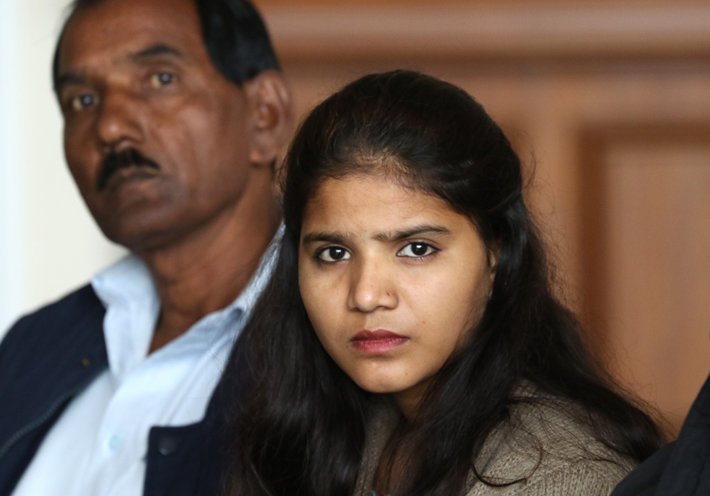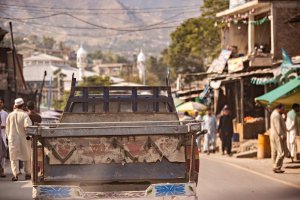The release of Asia Bibi on May 8, 2019, has brought hope to the international religious community that greater tolerance of religious minorities in Pakistan is possible.

Bibi, a Christian woman who was sentenced to death in 2010 under Pakistan’s controversial blasphemy laws, spent the next eight years in prison, often in solitary confinement.
In her first live message from exile in Canada, Bibi said, “I want to thank an angel, a person who helped me from my imprisonment until now: that person is Ján Figel, the EU’s special envoy for Religious Freedom.”
Figel helped secure the acquittal and release of Bibi from her long imprisonment. In an interview with Catholic News Agency (CNA), Figel spoke of Bibi’s bravery and his hope that positive change will be inspired by the outcome of her case.
He praised Bibi as “an admirably brave woman and loving mother. She did not give up her Christian faith [in exchange for freedom], and she represents encouragement for many others facing false blasphemy accusations.”
Figel told Andrea Gagliarducci of CNA that under the previous government, “relatively small groups took streets hostage, and de facto dictated some decisions to the elected government. Now, leaders of militant groups and violent extremists have been jailed after massive public protests.”
He was optimistic that success of this case “proves that the EU as a soft power can facilitate positive changes in the world in the area of justice, sustainable development, and human rights protection through more efficient Freedom of Religion and Belief promotion.”
A farmworker in rural Pakistan when she was sentenced to death, Bibi’s plight drew international attention to Pakistan’s repressive blasphemy law.
In 2009, Bibi, a Catholic, was harvesting berries with a group of Muslim women when she was accused of insulting the Islamic prophet Muhammad after an argument arose over her drinking well water from the same cup as the Muslim women. She was sentenced to death after her confession, extracted by a village mob that beat her nearly unconscious. Bibi denies committing blasphemy, insisting the accusation came from a disgruntled neighbor trying to “settle an old score” involving a feud with Bibi’s family.
Many human rights advocates and groups, including Pope Francis, pressured Pakistan to drop the charges against Bibi.
“There are many other cases where the accused are lying in jail for years. The world should listen to them.”—Asia Bibi
Anyone close to Bibi or supporting her was at risk. Salmaan Taseer, governor of Punjab province where Bibi was arrested, and Pakistan Minority Affairs Minister Shahbaz Bhatti were both assassinated after expressing public support for Bibi.
Faced with death threats, her husband and five children went into hiding.
After Bibi’s conviction was finally overturned by Pakistan’s Supreme Court in 2018, extremist factions attempted to have the ruling reversed, but this was denied. The backlash over her acquittal from far-right conservative Islamists in Pakistan caused violence, with faction leaders calling for her death and the death of the judges who acquitted her. The new Pakistani government led by Prime Minister Imran Kahn had to call in the military to quell the rioting and establish order.
Although Bibi was acquitted, she and her husband were kept in protective custody for months while the new government brought order and arrangements were made to enable them to safely join their children, who were relocated to Canada.
Finally, on May 8, 2019, Bibi and her husband left Pakistan and were reunited with their daughters. Their location remains undisclosed amid concern that extremists would murder Bibi if they could find her.
Speaking to the Sunday Telegraph, Bibi urged “the whole world to pay attention to this issue ... There are many other cases where the accused are lying in jail for years and their decision should also be done on merit. The world should listen to them.”
_______________
Many religions coexisted in South Asia before the Great Partition that separated India and Pakistan in 1947, including Sunni Islam, Hinduism, Christianity, Ahmadiyya, Bahá'í, Sikhism, Zoroastrianism, Kalash, Jainism, Buddhism and Judaism. Freedom of religion is guaranteed by the Pakistani constitution, athough Islam is the state religion.
Ironically, blasphemy laws were introduced by the British government for a purpose opposite to the way they are used today, as an article on the FoRB [Freedom of Religion or Belief] in Full website explains:
“The laws were first introduced to British administered India in 1860 to prevent religious communalism and intra-religious conflict. They were codified within the Indian Penal Code (IPC) to protect places of worship and sacred objects from defilement (Section 295); religious assemblies from disturbance (Section 296); funeral remains and burial sites from malicious trespass (Section 297); and religious feelings of any person from deliberate insult (Section 298). Pakistan inherited the laws after Partition.
“In 1980, the blasphemy laws were expanded to criminalise making derogatory remarks against Islamic personages. In 1982, Section 295-B was added, criminalising the desecration of the Qur’an. Section 295-C was added in 1986, which made derogatory remarks against the Prophet Muhammad a criminal offence punishable by death or life imprisonment.”
Laws originally meant to ensure tolerance among religions were increasingly used to prevent it.
“The National Commission for Justice and Peace (NCJP), a human rights organisation based in Pakistan, found that a total of 776 Muslims, 505 Ahmadis, 229 Christians and 30 Hindus were accused under the blasphemy laws between 1987 and 2018.
“What is clear is that the blasphemy laws are not a deterrent. They have become a weapon of revenge used indiscriminately against Muslims and non-Muslims in situations that arise due to petty grievances, jealousy and business rivalry, under the guise of preventing insults to religion.”
“In some cases the mob is so stirred up that targets of blasphemy accusations are killed before allegations are even investigated.”
Speaking with Pakistani officials about the need for change on the heels of Asia Bibi’s acquittal and release, Jan Figel said his involvement in Bibi’s case was intended to shed light on issues of religious freedom, because “Asia Bibi was famous worldwide as an evident abuse of freedom of religion and beliefs.”
Figel credits the new government of Pakistan Prime Minister Imran Khan for “real progress.” “[The government] was brave enough to take responsibility into [its own] hands from militant groups who successfully took the State as a hostage under the previous government.”
In connection with mass atrocities and persecution of religious and ethnic minorities by the ISIS in the Middle East, the European Parliament requested EU to grant stronger support of freedom of religion or belief with a new permanent position. In May 2016, the President of the Commission, Jean-Claude Juncker, adopted the decision to create the function of Special Envoy for the promotion of the freedom of religion or belief outside the EU. The Commission decided to appoint Ján Figel as the first Special Envoy.
The Special Envoy serves as Special Adviser to the Commissioner for International Cooperation and Development.
From its beginnings, the Church of Scientology has recognized that freedom of religion is a fundamental human right. In a world where conflicts are often traceable to intolerance of others’ religious beliefs and practices, the Church has, for more than 50 years, made the preservation of religious liberty an overriding concern.
The Church publishes this blog to help create a better understanding of the freedom of religion and belief and provide news on religious freedom and issues affecting this freedom around the world.
For more information visit the Scientology website or Scientology Network.


